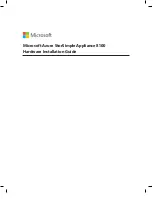
Appendix B. Example script files
This appendix provides example scripts for configuring a storage subsystem. These examples show how
the script commands appear in a complete script file. Also, you can copy these scripts and modify them
to create a configuration unique to your storage subsystem.
You can create a script file in two ways:
v
Using the
save storageArray configuration
command
v
Writing a script
By using the
save storageArray configuration
command, you can create a file that you can use to copy
an existing configuration from one storage subsystem to other storage subsystems. You can also use this
file to restore an existing configuration that has become corrupted. You also can copy an existing file to
serve as a pattern from which you create a new script file by modifying portions of the original file. The
default file extension is
.scr
.
You can create a new script file by using a text editor, such as Microsoft Notepad. The maximum line
length is 256 characters. The command syntax must conform to the guidelines in the Chapter 1, “About
the Command Line Interface,” on page 1-1 topic, and the Chapter 2, “About the Script Commands,” on
page 2-1 topic. When you create a new script file, you can use any file name and extension that will run
on the host operating system
This example shows how to run a script file from the command line.
c:\...\smX\client>smcli 123.45.67.88 123.45.67.89
-f scriptfile.scr;
Configuration script example 1
This example creates a new volume by using the create volume command in the free space of a Array.
Show “Create RAID 5 Volume 7 on existing Array 1”;
//Create volume on Array created by the create
volume drives command
//Note: For Arrays that use all available
capacity, the last volume on the group is created using
all remaining capacity by omitting the capacity=volume
creation parameter
create volume volumeGroup=1 RAIDLevel=5 userLabel=”7”
owner=A segmentSize=16 cacheReadPrefetch=TRUE capacity=2GB;
show “Setting additional attributes for volume 7”;
//Configuration settings that cannot be set during volume
creation
set volume[“7”] cacheFlushModifier=10;
set volume[“7”] cacheWithoutBatteryEnabled=false;
set volume[“7”] mirrorEnabled=true;
set volume[“7”] readCacheEnabled=true;
set volume[“7”] writeCacheEnabled=true;
set volume[“7”] mediaScanEnabled=false;
set volume[“7”] redundancyCheckEnabled=false;
set volume[“7”] modificationPriority=high;
This example shows blank lines between the lines beginning with
Show, Create,//Note
, and
create
. The
blank lines are included in this example only for clarity. Each command is actually written on one line in
the script file; however, the size of this page has caused the command text to wrap. You might want to
© Copyright IBM Corp. 2008, 2012
B-1
Summary of Contents for System Storage DS3000
Page 599: ...Appendix A Examples of information returned by the show commands A 3...
Page 601: ...Appendix A Examples of information returned by the show commands A 5...
Page 603: ...Appendix A Examples of information returned by the show commands A 7...
Page 605: ...Appendix A Examples of information returned by the show commands A 9...
Page 607: ...Appendix A Examples of information returned by the show commands A 11...
Page 609: ...Appendix A Examples of information returned by the show commands A 13...
Page 611: ...Appendix A Examples of information returned by the show commands A 15...
Page 623: ...Appendix A Examples of information returned by the show commands A 27...
Page 625: ...Appendix A Examples of information returned by the show commands A 29...
Page 627: ...Appendix A Examples of information returned by the show commands A 31...
Page 651: ......
Page 652: ...Part Number 00W1466 Printed in USA GA32 0961 05 1P P N 00W1466...
















































